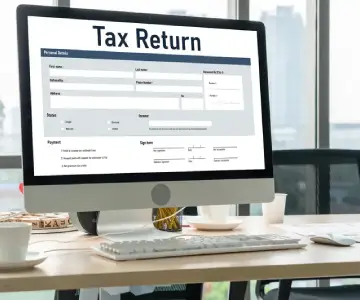Corporate Tax Return Filing Service in UAE
Corporate Tax Return Filing Deadlines in UAE
| Accounting Period | Return Filing Deadline - (09 Months) | If you Have Penalty to Waive off it, Return Filing Deadline (07 Months) |
|---|---|---|
| Jan 2024 to December 2024 | September 30,2025 | July 31, 2025 |
| April 2024 to March 2025 | December 30, 2025 | October 31, 2025 |
| Jan 2025 to December 2025 | September 30,2026 | July 31, 2026 |
FREE CONSULTATION

How to File a Corporate Tax Return in the UAE
Here is a detailed procedure for Corporate tax return filing through the portal:
Registration
- Check Tax Registration (In Case Has Not Been Done):-Please check that your company is registered for tax at the FTA before you submit your corporate tax returns.
- If your company is not yet registered: Obtain a Tax Registration Number (TRN): Go to the EmaraTax home page, and look for and click on the Apply Now link, and then fill in the registration form and submit the application. Once the documentation process is approved, one is issued a TRN.
Prepare Required Documents:- Add all the original and copies of any receipts, invoices, and documents proving earnings and all the expenses of the company, such as Financial Statements by incorporating profit and loss statements and balance sheets as well as cash flow statements, are up-to-date and accurate with detailed Tax Calculations.
File the Application:- After preparing the essential documents, proceed with submitting your corporate tax return:-
- Log in to the EmaraTax Portal: Lodge yourself to the FTA’s online platform via your login credentials.
- Complete the Tax Return Form: All fields current, including all required financial amounts and your TRN number.
- Upload Supporting Documents: At this point, affix documents that support or underpin the tax return contained in your return.
- Review and Submit: Take the time to go back over information, make sure it is correct, and only then fill out the application.
Receive Tax Registration Certificate
- After the FTA reviews and approves your corporate tax return submission, from the FTA, you will be issued with an official Tax Registration Certificate that confirms your company for corporate tax and filing compliance.
Contact Us

Documents Required for UAE Corporate Tax Return Filing
For Corporate tax return filing in the UAE, one must have essential documents that would capture all the financial transactions of the business for determining the amount of payable tax in line with the country laws.
Financial Records:- Essential documents include:
- Profit and Loss Statements: These detail on how the company generates its revenues, the expenses incurred in the process and the revenues earned in a given period of time.
- Balance Sheets: This document gives a statement of the financial situation of the organization at a given period of the year, giving information on the assets, liabilities, and equities of the business.
- Cash Flow Reports: These reports illustrate the movement of cash within the business, providing insight into its liquidity.
Taxable Income Calculations:- Accounting income is thus adjusted for tax-specific factors in order to arrive at the taxable income.
- Adjustments for Non-Taxable Income: Record of that income that could be tax-exempt.
- Deductions for Allowable Expenses: Accounts relating to ascertaining costs that may be claimed back in the form of tax deductions.
Depreciation Records:- Depreciation records are crucial for accurately reflecting the value of assets and claiming appropriate deductions:
- Depreciation Schedules: These describe how each of the assets is being written off over the period of its useful life.
- Fixed Asset Registers: A listing of all the fixed assets possessed by the company with information on the date purchased, the cost, and the amount of depreciation charged against it.
Contact Us

Transfer Pricing Documentation
Essential for businesses involved in transactions with related parties, these records ensure compliance with arm's length principles.
- Transfer Pricing Documentation: Narrative reports on the amounts and reasons for the prices in the transactions with related parties.
- Comparable Uncontrolled Price (CUP) Method: technique employed in transfer pricing to benchmark the price of a transaction between associated companies with a similar transaction between different companies.
Related Party Transactions:- Businesses must disclose transactions with related parties, including subsidiaries, affiliates, and entities with common ownership, to ensure transparency and compliance by disclosing all transactions,the nature of the transactions and their value with documentary proof i.e.Agreements and Contracts.
Additional Information:-
When preparing your corporate tax return, ensure you have the following information:
- Income Tax Computation: taxable income is arrived at using the financial statements of the business.
- Deduction Receipts: Keep detailed records of all expenses that qualify as deductible to support your corporate tax filings.
- Assumptions for Exempt Income: According to the financial statements of the portfolio, offer approximations of the exempt income.
- Exemption/Exception Status: Supporting papers that shoot any exemptions to taxation.
- Business Loan Documentation: Record as part of the accounting records of interest paid on the loans.
- Foreign Tax/Credit Treatments: Appropriate for ventures with incomes from other nations that can be taxed.
Maintaining Accurate Accounting Records:-
Compliance with corporate tax regulations requires ongoing diligence in maintaining your company’s accounting records:
- Track All Financial Transactions: It is good to maintain proper accounts of all the income, expenditures, and the rest of the assets as well as the liabilities of all the colors of the financial year.
- Use Reliable Accounting Software: By adopting accounting software, you are sure that your books are clean and you can retrieve them easily for the purpose of filing tax.
- Regular Review and Update Records: Ensure that your accounting records are updated from time to time in order to reduce the costs incurred and also get a true picture of your business.
Contact Us
Frequently Asked Questions
What is meant by the filing of a corporate tax return?
When Corporate Tax Return Filing is Due?
What sorts of documents are required to be attached while filing corporate tax returns?
Whether corporate income taxes can be filed online?
What other deductions can a corporate body take in computing its income tax?
What measures should a business take concerning corporate tax filing?
Is it possible that the corporate tax return can be filed after the due date/anticipated date?
As for the procedure of Corporate tax return filing in the UAE, it is essential to operate within the frameworks of certain rules and deadlines. Formulations that must be made towards the necessity of pricing and cost changes, addressing Free Zone conditions, and partnering with a professional and reputable tax advisor will act as tools to overcome the mentioned tax challenges.